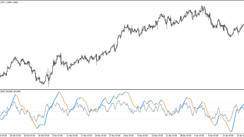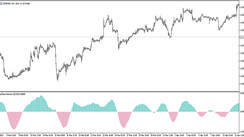The dollar continues to gradually strengthen, despite the "persuasion" of the head of the Fed, Jerome Powell. Speaking in Congress Wednesday and Thursday, he said the central bank will not rush to cut monthly asset purchases and that the economy is "still far" from the Fed's targets. Nevertheless, Powell acknowledged that inflation is growing faster than expected, and if it goes beyond the acceptable limits, monetary policy will have to be tightened ahead of schedule.
He said that the recent rise in consumer prices has pushed inflation out of the short-term target zone “slightly” above 2%, and this is “a shock to the system...”. “Of course, we are not satisfied with this", Powell said, noting that Fed officials are closely monitoring inflation expectations to see if they need to reconsider their position.
Worries about how long inflation will last, how it will affect future earnings and the stock market, given the growing likelihood that the Federal Reserve may begin phasing out stimulus policies ahead of schedule, and worries about the spread of the coronavirus worsen investor sentiment and support the US dollar. The DXY dollar index closed last week with an increase of +0.57%, and the potential for its further growth remains. Fed leaders find it increasingly difficult to contain the strengthening of the dollar against the backdrop of rising inflation, showing record growth rates over the past 29 years. Sooner or later, they will have to start curtailing the stimulating policy.
Next week, financial market participants will pay attention to the publication of important macro statistics on Germany, Australia, the USA, the Eurozone, Great Britain, Canada, as well as the results of the meetings of the central banks of China and the Eurozone on monetary policy issues.
Of the most significant macroeconomic data, the publication of which is expected next week, it is worth noting the following:
*) new events can be added to the calendar and/or some scheduled events canceled during the coming week
**) specified time – GMT
Monday, July 19
No important macro statistics are scheduled to be published.
Tuesday, July 20
01:30 CNY People's Bank of China Interest Rate Decision
Since May 2012, the People's Bank of China has been steadily lowering the interest rate, providing support to Chinese manufacturers. The bank last lowered the rate in April 2020 (by 0.20% to 3.85% at the moment).
In 2020, in the context of international trade conflicts and a slowing global economy, the world's largest central banks took the path of easing their monetary policies in order to support national economies and increase the competitive ability of goods exported from these countries.
The People's Bank of China is also in line with this process. The depreciation of the yuan became especially relevant in the last 2 years, when the confrontation between the two most powerful economies in the world began. One of the measures to offset the negative effects of increased duties on the import of Chinese goods to the United States was the depreciation of the national currency of China. This measure was designed, among other things, to maintain the previous volumes of Chinese products imported to the United States, which would cost American buyers cheaper due to the difference in the exchange rates of the national currencies of the United States and China.
An additional strong negative factor was the coronavirus.
It is likely that at this meeting, the People's Bank of China will keep the interest rate at the same level of 3.85%, although a rate cut is also possible.
However, if the People's Bank of China makes unexpected statements or decisions, volatility may increase throughout the financial market. Investors will also be interested in the bank's assessment of the impact of the coronavirus on the Chinese economy and its policy in the near future in this regard.
01:30 AUD Minutes from the July meeting of the RB of Australia
This document is published two weeks after the meeting and the decision on the interest rate. If the RBA positively assesses the state of the labor market in the country, the rate of GDP growth, and also shows a hawkish attitude towards the inflation forecast in the economy, the markets regard this as a higher probability of a rate hike at the next meeting, which is a positive factor for the AUD. The bank's soft rhetoric regarding, above all, inflation puts pressure on the AUD.
Market participants believe that the RBA will not raise interest rates until 2024, as promised by central bank officials. Wages continue to rise slowly, and household debt has risen to an all-time high, which also puts higher interest rates in the longer term.
"The economic recovery will be uneven and unstable", and "unemployment may remain high for a long time", said the leaders of the RBA after one of the last meetings of the bank, promising that "the rate will not rise until the Central Bank sees progress on the issue moving towards full employment and stable inflation rates in the 2% -3% range”.
According to the head of the RBA, Philip Lowe, "there are no serious arguments in favor of tightening monetary policy in the short term". In his opinion, "some time will pass before interest rates rise".
Nevertheless, if the published minutes contain unexpected information concerning the issues of the RBA's monetary policy, the volatility in the AUD quotes will increase.
08:00 EUR ECB Bank Lending Survey (BLS) in the Eurozone
Research conducted by EU financial experts on the state of the bank lending system is carried out 4 times a year. The main goal of the study is to obtain expanded information on the conditions of bank lending in the Eurozone.
The obtained data are used by the ECB management when making decisions on the bank's monetary policy. This report may cause increased volatility in the euro quotes and on the European stock market at the time of its publication, if it contains unexpected conclusions regarding the terms of lending to businesses and households in the Eurozone.
23:50 JPY Bank of Japan Monetary Policy Committee Meeting
At this meeting, the Monetary Policy Committee of the Bank of Japan will once again summarize the results of last week's meeting of the bank, analyze the economic situation in Japan and provide guidance on possible future prospects for the Bank of Japan's financial policy.
If the tone of the minutes of the meeting indicates the firmness of the Bank of Japan's intentions regarding monetary policy in the country, it will negatively affect the Japanese stock market and strengthen the yen. Conversely, soft rhetoric about the bank's monetary policy outlook will contribute to the weakening of the yen and the growth of the Japanese stock market.
Wednesday, July 21
01:30 AUD Retail Sales
The Retail Sales Index is published monthly by the Australian Bureau of Statistics and measures total retail sales. The index is often considered an indicator of consumer confidence and reflects the health of the retail sector in the near term. A rise in the index is usually positive for the AUD; a decrease in the indicator will negatively affect the AUD. Previous index value (for May) +0.4%. If the data turns out to be weaker than the previous value, then the AUD may sharply decline in the short term, above the previous values, then the AUD is likely to strengthen.
Thursday, July 22
Japan celebrates the National Day of the Sea. The banks of this country will be closed, in connection with which the trading volumes during the Asian session will be reduced.
11:45 EUR ECB rate decision
The ECB will publish its decision on the key rate and on the deposit rate. The ECB's tough stance on inflation and key interest rates contributes to the strengthening of the euro, while the soft stance and rate cuts weaken the euro. In September 2019, the European Central Bank lowered its key interest rate on deposits by 0.1%, to -0.5%, for the first time since March 2016, and began buying bonds worth 20 billion euros a month, renewing the so-called quantitative easing program. According to the ECB leadership, the balance of risks for the economic prospects of the Eurozone "is still shifted to the negative side", and "until inflation is in line" with the target level, which is just below 2%, the rate will remain low. The new forecasts of the ECB on rates and the QE program can be viewed as a signal of the inclination to further soften policy amid unwilling inflation to accelerate.
After Brexit, trade conflicts, factors of political instability in Europe, as well as the growing coronavirus pandemic, due to which European countries are forced to introduce new quarantine restrictions that negatively affect economic activity, are the main threats to the European economy. Back in March 2020, the ECB signaled the possibility of policy easing, and the bank's representative admitted that the bank's management could lower the already negative interest rates even lower.
Probably, following the results of this ECB meeting, the key interest rate will remain at the same level of 0%. The ECB's rate on deposits for commercial banks is also likely to remain at -0.5%. At the same time, there is a possibility that at this meeting the ECB will announce a new program to stimulate the economy, which will put pressure on the euro.
12:30 EUR ECB press conference
The press conference will be of primary interest to market participants. In its course, a surge in volatility is possible not only in the euro quotes, but also in the entire financial market, if the ECB leaders make unexpected statements. ECB leaders will assess the current economic situation in the Eurozone and comment on the ECB's rate decision. In previous years, based on the results of some ECB meetings and subsequent press conferences, the euro exchange rate changed by 3% -5% in a short time.
The softer tone of the statements will have a negative impact on the euro. Conversely, a tough tone from ECB officials on central bank monetary policy will strengthen the euro.
Friday, July 23
Japan celebrates the national holiday the Day of Sports and Health. The banks of this country will be closed, in connection with which the trading volumes during the Asian session will be reduced.
07:30 EUR Markit Economics Business Activity Index (PMI) in the manufacturing sector of the German economy (preliminary release). Composite index (PMI) of business activity in the German economy according to Markit Economics (preliminary release)
The PMI business activity index in the manufacturing sector of the German economy is an important indicator of the business environment and the overall state of the German economy. This sector of the economy forms a significant part of Germany's GDP. A result above 50 is seen as positive and strengthens the EUR, while a result below 50 is seen as negative for the euro. Forecast for July (preliminary release): 64,1.
Previous monthly values: 65,1, 64,4, 66,2, 66,6, 60,7, 57,1, 58,3, 57,8, this indicates an acceleration of business activity in this sector of the German economy after its slowdown in 2020 due to the coronavirus pandemic. The growth of the indicator above the previous values will support the euro (in the short term). Data worse than the forecast will have a negative impact on the euro.
The composite PMI business Activity index in the German economy is an important indicator of the business environment and the overall state of the German economy. A result above 50 is seen as positive and strengthens the EUR, while a result below 50 is seen as negative for the euro. July forecast (preliminary release): 61,0 vs 60,1, 56,2, 55,8, 57,3, 51,1, 50,8, 52,0, 51,7 in the previous months. The publication of this indicator with the specified expected value is likely to support the euro in the short term. Data worse than the forecast and below the value of 50.0 will have a negative impact on the euro.
08 00 EUR Composite index (PMI) of business activity in the manufacturing sector of the Eurozone economy according to Markit Economics (preliminary release)
The PMI manufacturing PMI is an important indicator of the overall health of the European economy. A result above 50 is seen as positive and strengthens the EUR, while a result below 50 is seen as negative for the euro. July Forecast (preliminary release): 60,0 vs 59,5, 57,1, 53,8, 53,2, 62,5, 48,8, 47,8, 49,1, 45,3 in the previous months, which is likely to have a positive impact on the euro. If the data is worse than the forecast, the euro may decline sharply in the short term.
08:30 GBP Index (PMI) of business activity in the services sector of the UK economy according to Markit Economics (preliminary release)
The PMI business activity index in the UK services sector is an important indicator of the state of the British economy. The services sector employs the majority of the UK's working-age population and accounts for approximately 75% of GDP. The most important part of the service sector is still financial services. If the data is worse than the forecast and the previous value, the pound is likely to decline sharply in the short term. The data is better than the forecast and the previous value will have a positive impact on the pound. At the same time, a result above 50 is seen as positive and strengthens the GBP, below 50 - as negative for the GBP.
Previous values of the indicator: 62,4 in June, 62,9 in May, 61,0 in April, 56,3 in March, 49,5 in February, 39,5 in January 2021 after falling to the levels of 29,0 in May, 13,4 in April, 34,5 in March 2020. Preliminary forecast for June: 62,0.
12:30 CAD Retail Sales Index
The Retail Sales Index is published monthly by Statistics Canada and measures total retail sales. The index is often considered an indicator of consumer confidence and reflects the state of the retail sector in the near term. An increase in the index is usually a positive factor for the CAD; a decrease in the indicator will negatively affect the CAD. The previous index value (for April) is -5,7% after falling in March 2020 by -9,9%, in April – by -25% and rising in May by +18,7%. If the data for May turns out to be even weaker than the forecast -5,0%, the CAD may decline sharply in the short term.





